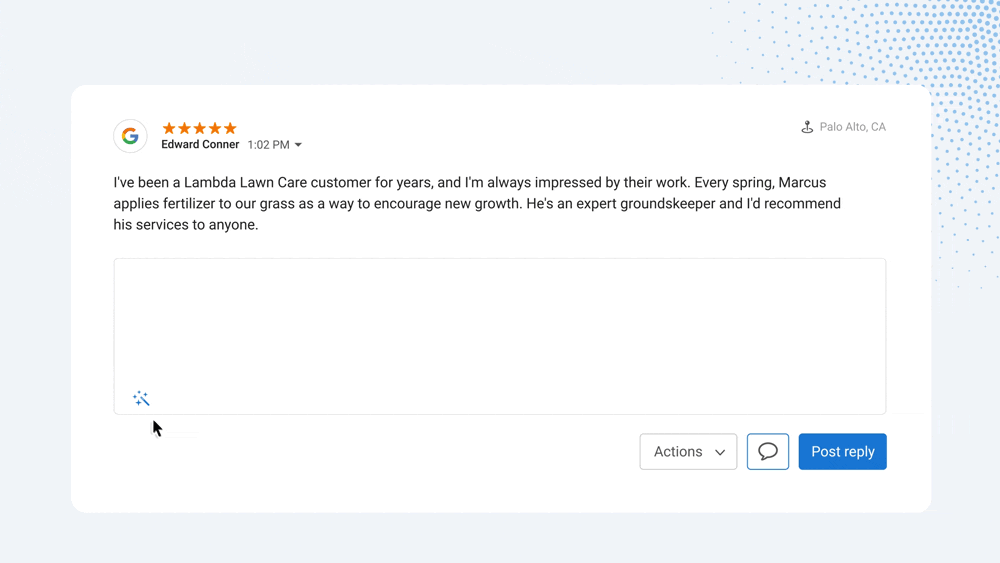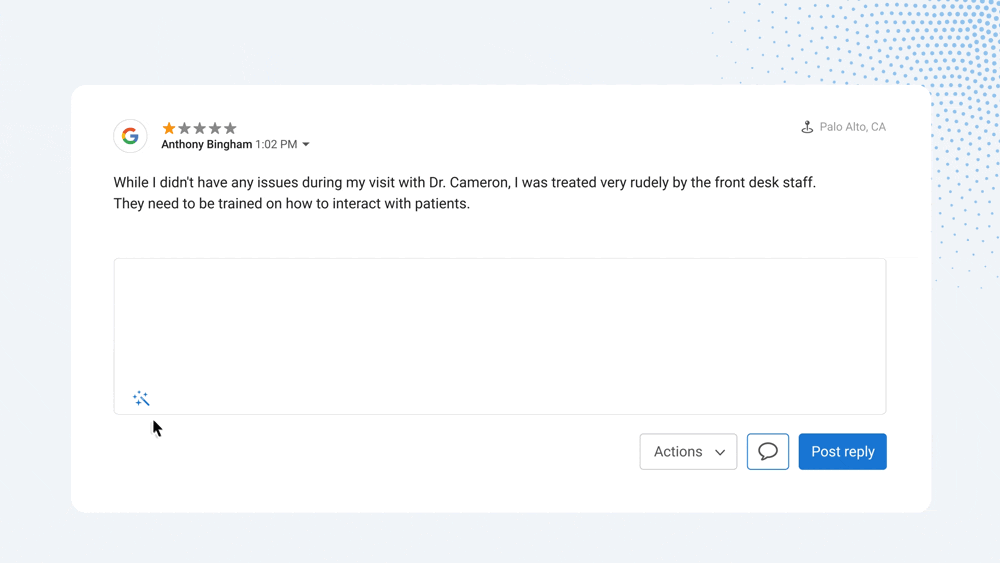AI-powered customer experiences for business success
Artificial Intelligence (AI) is taking the world by storm, transforming how local businesses operate and interact with customers through digital channels. The rapid development of AI is creating a new era of innovation as companies seek to use technology to stay ahead of the competition and meet the evolving needs of their customers. Let’s explore how Birdeye is leveraging AI for use by its customers.
Birdeye announces new AI solution
Birdeye recently announced the addition of a new review and survey response solution based on the ChatGPT model. Businesses can now use Birdeye’s AI platform to quickly generate personalized, human-like responses to customer reviews and surveys.
What this means for you: Imagine getting hundreds of new reviews and customer surveys every day. Coming up with well-crafted, personalized responses can be a challenge. This is where AI can help.
Pro tip: Generative AI technology can help to create unique responses quickly based on the written cues provided by the customer within the review and survey. All that is left for you is to give it a glance, edit it, and post your response.
Review response example

A negative review response example

AI is part of Birdeye’s DNA
Delivering actionable insights
While AI technology is at the forefront of media channels now, this is not new technology for Birdeye. The Birdeye platform has been using Natural Language Processing (NLP) and AI to sift through hundreds of thousands of reviews and survey responses to deliver actionable insights to businesses for several years. The two products that actively use AI day in and day out are Insights and Benchmarking.
- Insights – Birdeye’s advanced insights software, Athena, identifies the sentiment and keywords highlighted in customer feedback and neatly categorizes them based on the priorities of each business. From those insights, companies can take decisive action to improve their service and resolve issues raised by customers.
- Benchmarking – Athena also analyzes your competitors’ customer reviews from hundreds of review sites and social platforms. From that data, you can easily identify and track trending themes and leverage that intel in your campaigns.
Real-time view of the customer experience
Your customers can interact with you in various ways and for different reasons — setting up an appointment, making a payment, requesting customer support, or simply knowing your hours of operation. Their experience at each of those touchpoints may not necessarily be the same. Understanding the real-time satisfaction level of your customers can help you decide whether you want to send them a referral request or upsell another service or product.
Birdeye’s proprietary Experience Score can provide a real-time view of individual customers’ experiences across multiple interactions throughout their lifecycles. This allows businesses to customize their offerings and communications for maximum impact.
And that’s not all.
More ways AI can revolutionize the customer experience
As part of its AI Everywhere initiative, Birdeye is working on opening up a world of possibilities for digital customer experiences. The following are some examples of how Birdeye is exploring ways businesses can use AI successfully.
Real-time interactions through chatbots
With the help of AI-powered chatbots – businesses can provide instant responses to customer inquiries and support requests, improving response time and reducing customer frustration. Chatbots can handle routine queries, freeing up employees to focus on more complex issues. Modern chatbots will be able to scrape information from the business website to answer questions without having the need to feed specific FAQ information.
Sentiment analysis to prevent customer churn
AI-powered sentiment analysis can be used to monitor customer feedback on social media, review sites, and other online platforms. This allows companies to identify customer sentiment and respond quickly to negative reviews, improving customer satisfaction and preventing customer churn. AI algorithms can detect specific sources of customer satisfaction issues and accordingly create a response, and route the issues to the appropriate person who can make things right.
Personalize customer experiences
AI-powered algorithms can analyze customer data to identify preferences, behavior patterns, and past interactions with the brand. This data can then be used to deliver personalized experiences, such as customized product recommendations, tailored promotions, and personalized messaging.
One of the biggest challenges for businesses is truly knowing their customers. While customers may be familiar with a business, the reverse isn’t always true. Collecting information and building a comprehensive understanding of every customer, even those who only make a one-time purchase every few years, has been a persistent issue.
This is where Birdeye can help. Birdeye is uniquely positioned to solve this problem due to our deep industry insights and the vast trove of data from millions of customer interactions. By leveraging this wealth of data, we can fine-tune the AI models in a responsible way to help businesses respond to each customer in a way that reflects their service, brand, and values.
Proactive customer service
AI-powered systems can monitor customer behavior in real time, identifying potential issues and proactively addressing them before they escalate. For example, suppose a customer repeatedly searches for a specific product or service but does not find what they need. In that case, the system can send targeted recommendations to help them find what they are looking for.
Predictive analytics to increase retention
AI-powered predictive analytics can help companies anticipate customer needs and preferences, enabling them to offer relevant products and services proactively. For example, a company could use predictive analytics to recommend products to customers based on their purchase history and browsing behavior.
It’s an exciting time for businesses looking to leverage AI to manage customer experiences, increase loyalty, and reduce customer churn. As AI technology continues to evolve, businesses that embrace it will be better equipped to stay ahead of the competition and meet the evolving needs of their customers.
Here are answers to some questions about AI and ChatGPT that we get often:
Frequently asked questions about artificial intelligence
Artificial intelligence (AI) is an area of computer science that focuses on creating machines that can think and act like humans. AI systems perform problem-solving, decision-making, image recognition, language translation, and more tasks.
Generative AI, or generative machine learning, is a branch of artificial intelligence that focuses on training machines to produce data or outputs that can be used in various applications. Generative models use unsupervised learning techniques to learn from large datasets and generate new information from them. This type of AI can generate content such as images, text, music, and video. It can also be used for predictive analytics tasks and to create unique designs for products such as cars and robots.
ChatGPT is a large language model created by OpenAI that uses deep learning algorithms to generate natural language responses to a wide variety of questions and prompts. The program is trained on large amounts of text from the internet, books, and other sources, which allows it to generate human-like responses on different topics.
How it works: People can interact with ChatGPT by typing in questions or prompts, and the program will generate a response.
Supercharge your business with Birdeye
Birdeye is an AI-powered platform for online reputation management and customer experience that offers advanced tools to over 200,000 businesses. The platform manages customer experiences across all touchpoints, adapting to meet digital needs quickly. For more information on how Birdeye can help your business, watch this demo and then book a time to chat with a Birdeye product expert.
Originally published



![[Feature image] From SEO to GEO- Why brands must optimize for AI search now](https://birdeye.com/blog/wp-content/uploads/Feature-image-From-SEO-to-GEO-Why-brands-must-optimize-for-AI-search-now-375x195.png)





